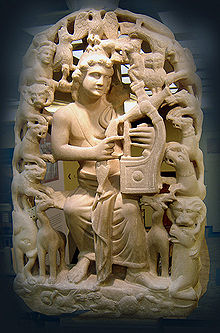Laïko
| Music of Greece | |
|---|---|
 |
|
| General topics | |
| Genres | |
| Specific forms | |
| Media and performance | |
| Music awards |
|
| Music charts | |
| Music festivals | |
| Music media |
|
| Nationalistic and patriotic songs | |
| National anthem | "Hymn to Liberty" |
| Regional music | |
| Related areas | Cyprus, Pontus, Constantinople, South Italy |
| Regional styles |
|
Laïkó (Greek: λαϊκό τραγούδι, pronounced [laiˈko traˈɣuði], "song of the people"; "popular song", pl: laïká [tragoudia]), is a Greek music genre composed in Greek language in accordance with the tradition of the Greek people. Also called folk song or urban folk music (Gr: αστική λαϊκή μουσική or λαϊκά τραγούδια laïká tragoudia), in its plural form is a Greek music genre which has taken many forms over the years. Laïkó followed after the commercialization of rebetiko music. It was strong dominated by Greek folk music and is used to describe the whole of the Greek popular music. When used in context it refers mostly to the form it took in the period from the 1950s to the 1980s.
Until the 1930s the Greek discography was dominated by two musical genres: the Greek folk music (demotiká) and the Elafró tragoudi (literally: "light[weight] song"). The latter was represented by ensembles of singers/musicians or solo artists like Attik and Nikos Gounaris. It was the Greek version of the international popular music of the era. In the 1930s the first rebetiko recordings had a massive impact on Greek music. As Markos Vamvakaris stated "we were the first to record laïká (popular) songs". In the years to follow this type of music, the first form of what is now called laïkó tragoudi, became the mainstream Greek music.
1920s–1950s
1930s–1960s
Classic laïkó as it is known today, was the mainstream popular music of Greece during the 1960s and 1970s. Laïkó was dominated by singers such as Stelios Kazantzidis. Among the most significant songwriters and lyricists of this period are George Zambetas and the big names of the Rebetiko era that were still in business, like Vassilis Tsitsanis and Manolis Chiotis. Many artists combined the traditions of éntekhno and laïkó with considerable success, such as the composers Stavros Xarchakos and Mimis Plessas.
...
Wikipedia
